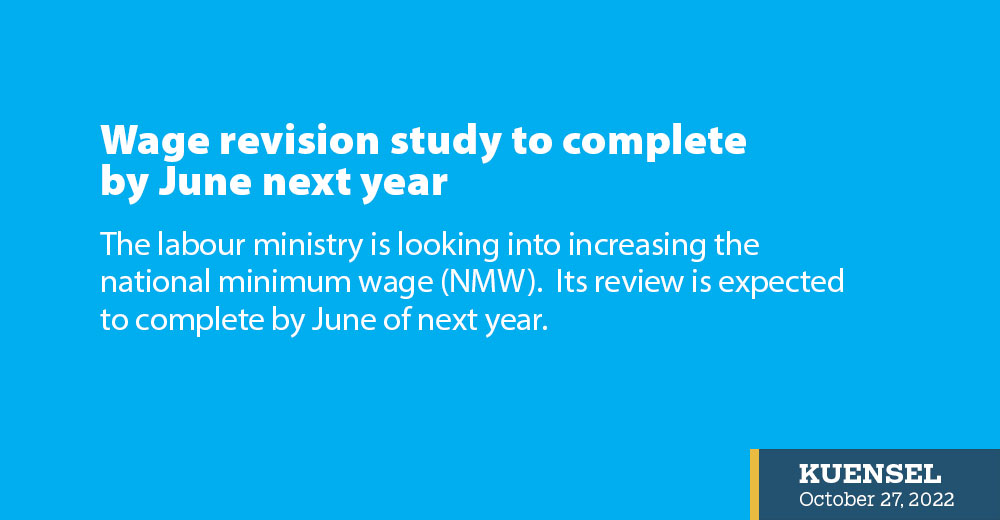Thukten Zangpo
The labour ministry is looking into increasing the national minimum wage (NMW). Its review is expected to complete by June of next year.
However, the revision will depend upon the recommendation from the study which is underway.
In the question-hour session of the winter session of the Parliament last year, Labour Minister, Karma Dorji said that the review of the NMW would be completed by early this year.
The government pledged to increase the national daily minimum wage to Nu 450 from Nu 125. The government term ends on October 31 of next year.
With the study extending up to June, some observers say the pledge may not come through since it would miss the summer or the last parliament session of this government.
The NMW rate was first established in the year 2011 with Nu 100 per day. It was further revised to Nu 125 per day in 2014.
A recent notification from the labour ministry has asked private firms to register in supporting tax data digitisation.
As recommended by the World Bank’s (WB) on NMW in 2020, the ministry stated that the digitisation of the existing tax records at the firm level for the most recent year available is needed, as well as collecting up-to-date information on firm-level revenues, expenditures and employment.
The WB recommended conducting a detailed study to reset NMW using a more scientifically based analysis that considers workers’ productivity.
“The data will thoroughly study the current situation of the private and corporate sectors in order to ascertain the state of the firms post-pandemic,” according to the department of labour’s social protection division.
It added that the data would also help to study and reveal the employer’s ability to pay as well as other pertinent details regarding worker productivity.
“The government does not want to set an unrealistic NMW and will, therefore, use this data to set an NMW that will be most beneficial for the country,” the division stated.
It added that it does not adversely affect the public or employment or heavily burden employers that in turn would negatively affect prospects for job seekers.
Since the country is beginning to recover from the effects of the pandemic and the last wage revision was in 2014, the social protection division stated that it is the right time to examine the private and public sectors and review the NMW.
A study titled, “Implications of Upward Revision of National Wage Rate in Bhutan,” conducted by a researcher with Centre for Bhutan and GNH studies concluded that an increase in wage rate would lead to an increase in labour costs and in turn, could trigger price inflation, affects exports, and reduce the level of employment.
Considering the private sector is still grappling with challenges post-pandemic, the study found that an increase in wage rate might worsen the current situation and recommended the government to either initiate minimal revision or defer the revision for a few more years.
Wage revision will also have an effect on the country’s legal system.
Presently, the compensatory damages, compensation, penalty amount in lieu of imprisonment, fines and penalty for violations, and offenses under the Penal Code of Bhutan (Amended) 2011 are based on the current minimum wage rate of Nu 125.
Similarly, fines and penalties as per the Narcotic Drugs, Psychotropic Substances and Substance Abuse Act of Bhutan 2015 are also based on the wage rate. The upward revision of the minimum wage rate will increase the fine and penalty.


